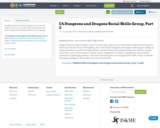
Imagine living in a world of dragons, elves, orcs and magic, where you are tasked with saving all that you know as home from unknown forces of wrongdoing.
- Subject:
- Education
- Social Science
- Material Type:
- Lecture Notes
- Date Added:
- 07/26/2016

Imagine living in a world of dragons, elves, orcs and magic, where you are tasked with saving all that you know as home from unknown forces of wrongdoing.
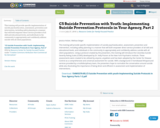
This training will provide specific implementation of suicide psychoeducation, assessment, prevention and intervention, including safety planning in a manner that will both empower direct service providers of all skill and educational levels, and individuals in the community to appropriately and confidently address suicide with all client populations.

Many of the families we serve in Wraparound have unresolved grief and loss issues that are often overlooked by Wraparound providers. This workshop will raise awareness of the impact of loss on the roles and responsibilities in families, provide a treatment framework based on Worden’s 4 Tasks of Grieving, and suggest specific interventions that Wraparound teams could do with families in Wraparound meetings that could help them get through these difficult times better.
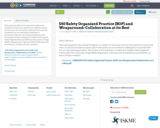
Team planning efforts have spread throughout our systems in recent years and are now required in many service areas. As new and innovative practices present themselves, we are sometimes challenged to incorporate them into our team planning processes. The purpose of this workshop is to define and integrate Safety Organized Practice (SOP) into the practice of high fidelity Wraparound. It will assist SOP and Wraparound practitioners, as well as all team members.
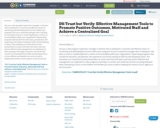
Are you a new program supervisor, manager or director who is looking for a concrete and effective means of monitoring and developing the services within your program? Are you a seasoned manager who is looking for new ideas on how to create/implement a culture of accountability within your organization? Supervising programs that include the education, perspectives, life experience and clinical training of staff can feel dizzying at times. This workshop is an introductory level presentation on some tools that have been used and proven effective that management can implement in their programs that helps to monitor and verify that services are being delivered while maintaining a focus on the children and families you serve as well as keeping the mission of your agency as the focal point.

This presentation will provide a foundation of effective parent partner strategies and effective team strategies. Presenters will provide engagement strategies, concrete family tools and resource mapping. The workshop will also highlight the success of the monthly Parent Retreat, a support group which provides affirmation and enhances social and emotional connection through brainstorming and peer support.
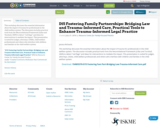
This workshop discusses the essential information about the impact of trauma for professionals in the child welfare system. The discussion includes practical tools from the Neurorelational Framework (Lillas and Turnbull, 2009) to detect “red flags” and ideas for interventions to mediate the impact. This presentation is suited for judges, attorneys, CASAs, child welfare professionals and others who interface with children and families in the child welfare system.
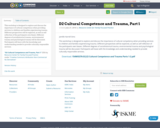
This workshop is designed to explore and discuss the importance of cultural competency when providing services to children and families experiencing trauma. Different perspectives will be explored, as well as self reflection of the participants own biases. Different degrees of sociohistorical trauma, environmental trauma and psychological trauma will be discussed. Participants will leave with the knowledge and understanding needed to provide culturally responsible services.

This workshop will focus on Sacramento County’s cross agency collaboration and outcome sharing to provide High Fidelity Wraparound planning for youth and their families. The presentation will outline the roles and relationships within the county as they relate to practice, training and system integration. Specific highlights will detail the implementation of performance measures and new initiatives. In addition, the workshop will include lessons learned and a youth/parent testimonial.

This training will provide an overview, insight and experiential opportunities to explore effective methods for providing Wraparound services to families with youth under 10 years of age. In a round robin format, the audience will spend time cycling through the four phases of Wraparound: engagement, planning, implementation and transition. Handouts and step by step techniques will be offered to help individuals practice specific activities in each phase that are intended to engage the youth and family. This training will benefit all mental health providers and allow them to deepen their practice working with youth, meeting them at their developmental level and using fun, hands on strategies to create mental health progress.
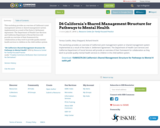
This workshop provides an overview of California’s joint management system or shared management system implemented as a result of the Katie A. Settlement Agreement. The Department of Health Care Services and California Department of Social Services will provide an overview of their framework for collaboration as they work to provide quality mental health services to children in the child welfare system.
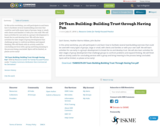
In this active workshop, you will participate in and learn how to facilitate several teambuilding exercises that could be used with many types of groups, large or small, with clients and families or with your own staff. We will learn activities for use early in a group’s development to break the ice and develop trust. We will also learn activities for later stages of group development that challenge groups to confront problems and expand thinking. We will finish with an activity useful for concluding services with a group and bring meaning to the process being concluded. Spots will be limited, so please arrive early!

Teaming on a highway of different participation styles is a skill often given little development. The norm is to put teams together, toss the dice and hope for synergy. This workshop will impact the way you team, by focusing on understanding and working with different “driving” or team participation styles. We will discuss how to keep the team moving toward integration and not get lost. You will leave this workshop with personal insight on your participation style and develop skills to collaborate with other or different participation styles

The course will provide new insights into creating and maintaining the vision of the family throughout the Wraparound process. The workshop will explore stages of change and how to support families in becoming ready to participate in the Wraparound process.

This presentation will provide a foundation of effective parent partner strategies and effective team strategies. Presenters will provide engagement strategies, concrete family tools and resource mapping. The workshop will also highlight the success of the monthly Parent Retreat, a support group which provides affirmation and enhances social and emotional connection through brainstorming and peer support.

This workshop will focus on the importance of including men in services. It will show the strengths that men bring to their children’s lives, the impact that they have on outcomes, and ways to overcome barriers to having men included.
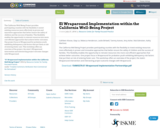
The California Well Being Project provides participating counties with the flexibility to invest existing resources more effectively in proven and innovative approaches that better ensure the safety of children and the success of families. This flexibility enables the opportunity to reinvest resources into more cost efficient approaches that achieve better outcomes. One project focus is Wraparound for probation youth exhibiting delinquency risk factors that put them at risk of entering foster care. This workshop offers an overview of the project, the state’s Wraparound intervention and intersecting project outcome changes with Wraparound.

This workshop is designed to explore and discuss the importance of cultural competency when providing services to children and families experiencing trauma. Different perspectives will be explored, as well as self reflection of the participants own biases. Different degrees of sociohistorical trauma, environmental trauma and psychological trauma will be discussed. Participants will leave with the knowledge and understanding needed to provide culturally responsible services.
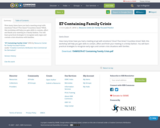
How many times have you had a meeting erupt with emotions? Once? Five times? Countless times? Well, this workshop will help you gain skills to contain, affect and finish your meeting in a timely fashion. You will learn practical strategies to recognize early signs and contain crisis situations with families.
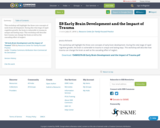
This workshop will highlight the three core concepts of early brain development. During this vital stage of rapid cognitive growth, the brain is vulnerable to trauma in unique and lasting ways. This workshop will describe how trauma can change the brain as well as the cascading effect of neglect.